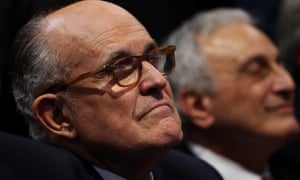Former New York City mayor, who is advising Donald Trump on national security, says electronic tags should be considered for those on terrorism lists

Former New York City mayor Rudy Giuliani has suggested the US government should put electronic monitoring bracelets on Muslims who are on the federal government’s terror watchlist.
“I would think that’s an excellent idea,” Giuliani told NJ.com. “If you’re on the terror watchlist, I should know you’re on the terror watchlist. You’re on there for a reason.”
At an “RNC at the DNC” event, Giuliani, who is currently acting as an informal adviser to Trump on terrorism and national security, said the Republican nominee could employ the same tactics used in France.
One of the attackers who killed a priest in Normandy, France, on Tuesday was wearing an electronic tag. He had reportedly been arrested and detained for 10 months after attempting to go to Syria. Upon his release, security services put an electronic tag on him and he was only allowed to leave his house between 8.30am and 12.30pm; the time frame during which time he committed the crime.
Electronic tags have been considered in various countries as a way to monitor potential terrorism suspects. A UK judge ruled last year that it was a violation of a the European Convention of Human Rights to ask a suspect to wear a tag.
Responding to the attacks in France, Chris Phillips, former head of the national counter-terrorism security office, told BBC Radio 4’s Todayprogram that the France attacks showed how ineffective tags are.
“[As] we have seen in France, that is ridiculous, because someone can have a tag on and go and commit an offence and the tag is not even being monitored,” he said. “Two thousand people on the radar of terrorists … How on earth could you ever monitor 2,000 people, let alone the number we have got now?”
The federal government’s terror watch list, which Giuliani suggested using, has long been a source of controversy, as the guidelines required for adding individuals are very broad.
At the event on Wednesday, Giuliani touted his record of surveilling mosques after the 1993 World Trade Center attack
“I put undercover agents in mosques for the first time in January 1994,” he said.
“I did it because the 1993 bombing was planned in a mosque in Union City, New Jersey, and a second plan was uncovered to bomb our subways, which was foiled,” Giuliani said. “And I kept those police officers in those mosques until I left as mayor.”
In 2011, an investigation by the Associated Press revealed a secretive NYPD program that was undertaking blanket surveillance on Muslim neighborhoods and mosques. The police unit that oversaw the surveillance program wasdisbanded in April 2014, after it drew widespread condemnation from and wassued by civil liberties groups.
“I would think that’s an excellent idea,” Giuliani told NJ.com. “If you’re on the terror watchlist, I should know you’re on the terror watchlist. You’re on there for a reason.”
At an “RNC at the DNC” event, Giuliani, who is currently acting as an informal adviser to Trump on terrorism and national security, said the Republican nominee could employ the same tactics used in France.
One of the attackers who killed a priest in Normandy, France, on Tuesday was wearing an electronic tag. He had reportedly been arrested and detained for 10 months after attempting to go to Syria. Upon his release, security services put an electronic tag on him and he was only allowed to leave his house between 8.30am and 12.30pm; the time frame during which time he committed the crime.
Electronic tags have been considered in various countries as a way to monitor potential terrorism suspects. A UK judge ruled last year that it was a violation of a the European Convention of Human Rights to ask a suspect to wear a tag.
Responding to the attacks in France, Chris Phillips, former head of the national counter-terrorism security office, told BBC Radio 4’s Todayprogram that the France attacks showed how ineffective tags are.
“[As] we have seen in France, that is ridiculous, because someone can have a tag on and go and commit an offence and the tag is not even being monitored,” he said. “Two thousand people on the radar of terrorists … How on earth could you ever monitor 2,000 people, let alone the number we have got now?”
The federal government’s terror watch list, which Giuliani suggested using, has long been a source of controversy, as the guidelines required for adding individuals are very broad.
At the event on Wednesday, Giuliani touted his record of surveilling mosques after the 1993 World Trade Center attack
“I put undercover agents in mosques for the first time in January 1994,” he said.
“I did it because the 1993 bombing was planned in a mosque in Union City, New Jersey, and a second plan was uncovered to bomb our subways, which was foiled,” Giuliani said. “And I kept those police officers in those mosques until I left as mayor.”
In 2011, an investigation by the Associated Press revealed a secretive NYPD program that was undertaking blanket surveillance on Muslim neighborhoods and mosques. The police unit that oversaw the surveillance program wasdisbanded in April 2014, after it drew widespread condemnation from and wassued by civil liberties groups.
